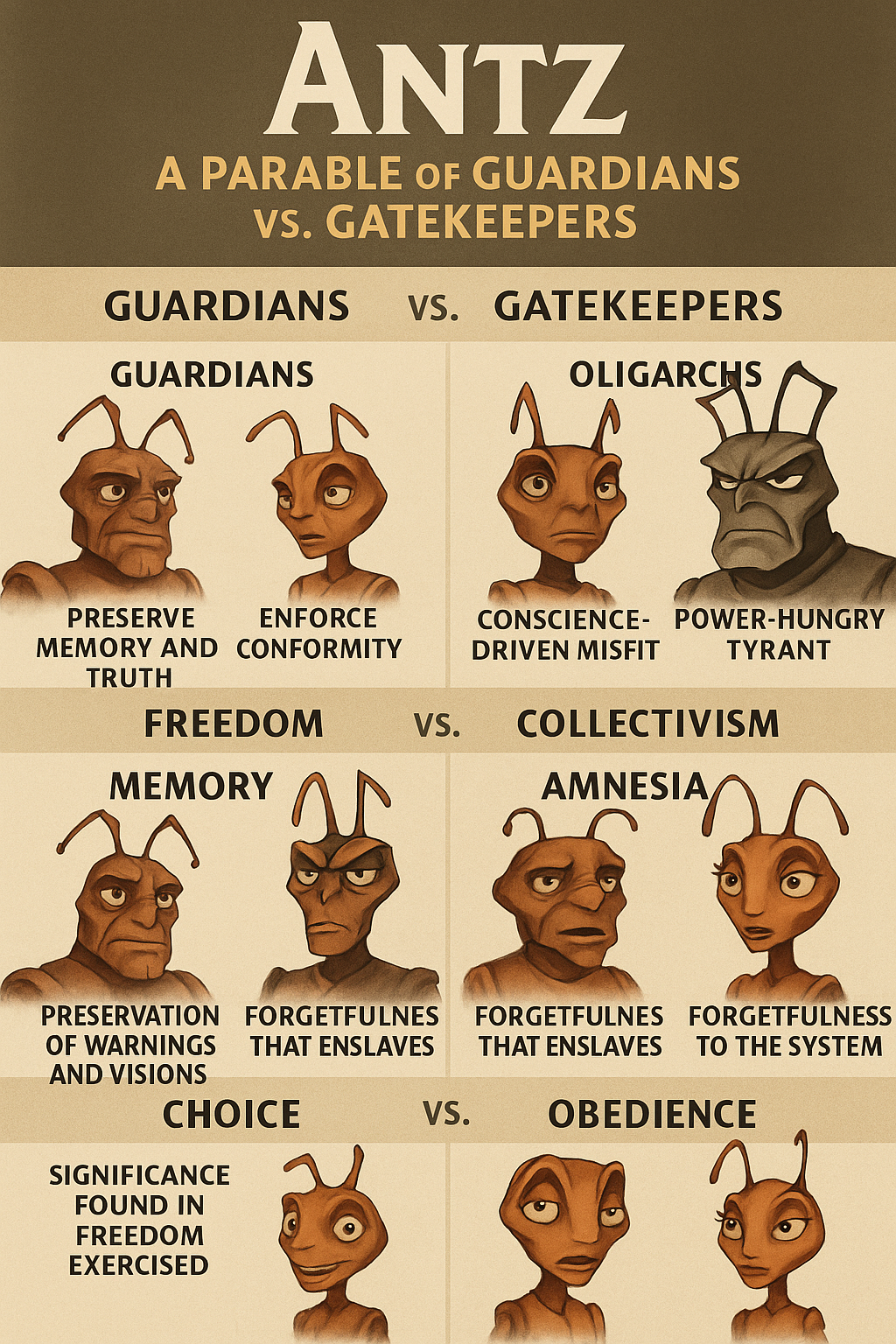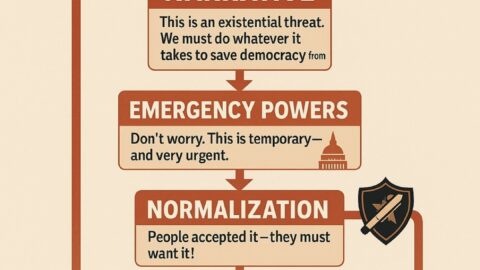Radicals vs. Oligarchs, Freedom vs. Collectivism, Memory vs. Amnesia, and Choice vs. Obedience
When Antz released in 1998, it appeared on the surface to be a quirky animated film with a neurotic main character. But beneath its humor and CGI, it is a parable of timeless conflicts: the individual against the system, the radical against the oligarch, the guardian of memory against the gatekeeper of control. Its story of Z — a restless worker ant who questions everything — resonates because it dramatizes the oldest battle humanity knows: freedom vs. collectivism, conscience vs. conformity, memory vs. amnesia.
The System and Its Tyrant: Mandible’s Oligarchy
General Mandible, the film’s villain, embodies the logic of all tyrants. He speaks the language of “sacrifice, discipline, and purity,” but behind his rhetoric lies an ambition to consolidate power, eliminate dissent, and rebuild the colony in his image.
Mandible engineers a suicidal war against termites not to defend the colony but to cull soldiers loyal to the queen. He dreams of washing away “the weak” to create a “pure colony.” His chilling declaration — “I am the colony” — captures the essence of oligarchic rule: the merging of the ruler with the system so that loyalty to the state becomes loyalty to the tyrant himself.
Here, Antz exposes a familiar deception: collectivist slogans are almost always masks for elite self-preservation.
The Radical Individual: Z and the Choice to Awaken
Z is the opposite of Mandible. Neurotic, awkward, and self-conscious, he begins the story plagued by insignificance. Yet it is precisely his discomfort that makes him dangerous to the system. He asks questions others avoid. He dreams of something better.
By chance, he becomes a “war hero” and, in his fumbling way, exposes the corruption of the colony’s power structure. But his true heroism lies not in accident or valor — it lies in choice. By the end, Z embraces his role in the colony not as a cog but as a free being who chooses his place.
The lesson is striking: significance is not granted by the system but forged in conscience and freedom.
The Gatekeepers Who Awaken: Weaver, Azteca, Cutter
Weaver, Azteca, and Cutter represent those inside the system who initially conform but later awaken.
- Weaver, the tough soldier, learns compassion after walking in a worker’s shoes.
- Azteca, the dutiful worker, questions the system when injustice touches her directly.
- Cutter, Mandible’s right-hand enforcer, defects when his conscience finally outweighs blind obedience.
These transformations show the thin line between gatekeepers and guardians. The system depends on their loyalty — but if truth pierces their armor, they can become allies of freedom.
Guardians of Memory and Prophecy: Barbatus and Grebs
No parable of freedom is complete without memory.
- Barbatus, the seasoned soldier, dies telling Z: “Don’t follow orders your whole life. Think for yourself.” His final words preserve truth beyond his death.
- Grebs, the old veteran dismissed as crazy, speaks of Insectopia — a vision of abundance and peace. He is a guardian of prophecy, holding onto hope even when ignored.
Together, they represent the prophets, dissidents, and truth-tellers of history who are often ridiculed but keep alive the memory of freedom.
The Conscience of the Elite: Bala
Princess Bala begins as a privileged royal, resigned to her role and her arranged marriage to Mandible. Yet through her journey with Z, she awakens to injustice. She chooses freedom over comfort, conscience over status, love over obedience.
Her transformation matters because it shows the elite always face a choice: collude with tyranny or break with it. Bala embodies the conscience of those born into privilege who decide to side with truth.
The Colony as Society: From Conformity to Freedom
The colony itself mirrors human society. In the beginning, ants chant obedience, work without questioning, and parrot slogans like “Be the ball.” By the end, inspired by Z and others, they resist orders, think for themselves, and act together to save one another from destruction.
The message is radical: freedom spreads not when the masses are told what to do but when individuals awaken and act — when conformity cracks under the weight of conscience.
Antz as Parable
Seen this way, Antz is no mere children’s movie. It is a parable of:
- Guardians vs. Gatekeepers — those who preserve memory and truth vs. those who enforce conformity.
- Radicals vs. Oligarchs — the conscience-driven misfit against the power-hungry tyrant.
- Freedom vs. Collectivism — choice and conscience vs. blind sacrifice to the system.
- Memory vs. Amnesia — the preservation of warnings and visions vs. the forgetfulness that enslaves.
- Choice vs. Obedience — significance found not in orders received but in freedom exercised.
The Final Question: Which Are You?
Antz leaves us with a question as urgent as any in history:
- Are you a guardian, preserving memory, conscience, and truth even when mocked?
- Are you a gatekeeper, defending a system that demands obedience at the cost of freedom?
- Or are you, like Z, an awkward radical beginning to wake up — insignificant in the eyes of the system, but capable of igniting a revolution of choice?
Because in the end, the colony is not Mandible. We are the colony.
Let’s break this down character by character, showing how they develop over the story and what they symbolize.
Z (the worker ant, protagonist)
- Beginning: Neurotic, self-doubting, plagued with “insignificance.” He is the archetype of the individual trapped in a collectivist system—he thinks too much, questions his place, and secretly dreams of something beyond “the colony.”
- Development: Through chance, rebellion, and love, Z stumbles into leadership. His quest for meaning leads him to challenge propaganda, reject blind obedience, and inspire others to think for themselves.
- End: Z matures from self-absorbed misfit into self-chosen leader. He learns significance is not given by the system but chosen by the individual. His arc mirrors the “awakening radical” who breaks the illusion of collectivism.
Princess Bala
- Beginning: Trapped in her own way—she rebels against royal duty by slumming in worker bars, frustrated by her arranged marriage to Mandible.
- Development: Initially spoiled and dismissive, Bala grows to see truth through Z’s eyes. Forced outside her palace bubble, she experiences danger, freedom, and choice.
- End: She evolves from reluctant princess into an active partner in change. She helps expose Mandible and joins Z in remaking the colony. Her arc reflects awakening conscience within the elite.
General Mandible
- Beginning: Embodiment of authoritarian collectivism. Obsessed with purity, discipline, and “the good of the colony.”
- Development: He orchestrates war, deception, and genocide under the guise of order. He represents the oligarch or tyrant who manipulates fear, sacrifice, and propaganda to consolidate control.
- End: Mandible reveals his true narcissism—“I am the colony.” His death shows the fate of authoritarian systems: collapse when the people awaken and refuse to obey.
Weaver (Z’s soldier friend)
- Beginning: Strong, loyal, and happy with his lot. He initially finds Z’s complaints humorous and unnecessary.
- Development: Through switching roles with Z, Weaver learns the worker’s grind, empathizes with Azteca, and discovers his own individuality.
- End: Weaver embodies the “converted conformist” — a loyalist who comes to see the truth when exposed to injustice. His romance with Azteca symbolizes bridging divides between castes.
Azteca (Z’s worker friend)
- Beginning: A committed worker who believes in the system but also cares about Z.
- Development: She questions the colony’s rigid rules after Weaver defends her. She shifts from blind acceptance to courage.
- End: She becomes Weaver’s partner, embracing individuality while retaining her strong work ethic. Azteca’s arc represents the everyday person who wakes up when given reason to believe change is possible.
Barbatus (soldier mentor)
- Beginning: Experienced, loyal soldier who embodies duty.
- Development: In the heat of battle, he saves Z and dies. His last words—“Don’t follow orders your whole life. Think for yourself”—are the film’s moral key.
- End: Though he dies, Barbatus sparks Z’s transformation. He represents the fallen guardian, the one who passes the torch of memory and conscience.
Colonel Cutter (Mandible’s second-in-command)
- Beginning: Obedient enforcer, cruel but disciplined.
- Development: He begins to doubt Mandible after witnessing the workers’ spirit and Bala’s courage.
- End: He breaks ranks, saves Z, and helps overthrow Mandible. Cutter illustrates how even gatekeepers can awaken and shift sides when conscience breaks through loyalty to the system.
Grebs (old veteran who speaks of Insectopia)
- Beginning: Dismissed as crazy, drunk, and irrelevant.
- Development: His testimony about Insectopia plants the seed of hope in Z.
- End: Though mocked, his memory preserves truth. He symbolizes the forgotten prophet — the eccentric who keeps alive the vision of freedom.
The Queen
- Beginning: Maternal but trapped by tradition. She trusts Mandible too much.
- Development: When Bala and Z expose the truth, she begins to support change.
- End: She represents the old guard — not fully corrupt, but compromised by habit and blind trust in authority.
Themes Through Characters
- Individual vs. System: Z’s journey is the triumph of the individual voice against collectivist conformity.
- Awakening vs. Obedience: Characters like Weaver, Azteca, and Cutter show that even loyalists can awaken.
- Corruption of Power: Mandible represents the oligarch’s lie that “the colony” (the system) is more important than the individual.
- Memory & Prophecy: Barbatus and Grebs illustrate how memory and truth-telling sustain hope.
- Freedom Through Choice: The final lesson—significance comes not from one’s caste or role, but from choosing one’s path.
Z (the worker ant, protagonist)
- Beginning: Neurotic, self-doubting, plagued with “insignificance.” He is the archetype of the individual trapped in a collectivist system—he thinks too much, questions his place, and secretly dreams of something beyond “the colony.”
- Development: Through chance, rebellion, and love, Z stumbles into leadership. His quest for meaning leads him to challenge propaganda, reject blind obedience, and inspire others to think for themselves.
- End: Z matures from self-absorbed misfit into self-chosen leader. He learns significance is not given by the system but chosen by the individual. His arc mirrors the “awakening radical” who breaks the illusion of collectivism.
Princess Bala
- Beginning: Trapped in her own way—she rebels against royal duty by slumming in worker bars, frustrated by her arranged marriage to Mandible.
- Development: Initially spoiled and dismissive, Bala grows to see truth through Z’s eyes. Forced outside her palace bubble, she experiences danger, freedom, and choice.
- End: She evolves from reluctant princess into an active partner in change. She helps expose Mandible and joins Z in remaking the colony. Her arc reflects awakening conscience within the elite.
General Mandible
- Beginning: Embodiment of authoritarian collectivism. Obsessed with purity, discipline, and “the good of the colony.”
- Development: He orchestrates war, deception, and genocide under the guise of order. He represents the oligarch or tyrant who manipulates fear, sacrifice, and propaganda to consolidate control.
- End: Mandible reveals his true narcissism—“I am the colony.” His death shows the fate of authoritarian systems: collapse when the people awaken and refuse to obey.
Weaver (Z’s soldier friend)
- Beginning: Strong, loyal, and happy with his lot. He initially finds Z’s complaints humorous and unnecessary.
- Development: Through switching roles with Z, Weaver learns the worker’s grind, empathizes with Azteca, and discovers his own individuality.
- End: Weaver embodies the “converted conformist” — a loyalist who comes to see the truth when exposed to injustice. His romance with Azteca symbolizes bridging divides between castes.
Azteca (Z’s worker friend)
- Beginning: A committed worker who believes in the system but also cares about Z.
- Development: She questions the colony’s rigid rules after Weaver defends her. She shifts from blind acceptance to courage.
- End: She becomes Weaver’s partner, embracing individuality while retaining her strong work ethic. Azteca’s arc represents the everyday person who wakes up when given reason to believe change is possible.
Barbatus (soldier mentor)
- Beginning: Experienced, loyal soldier who embodies duty.
- Development: In the heat of battle, he saves Z and dies. His last words—“Don’t follow orders your whole life. Think for yourself”—are the film’s moral key.
- End: Though he dies, Barbatus sparks Z’s transformation. He represents the fallen guardian, the one who passes the torch of memory and conscience.
Colonel Cutter (Mandible’s second-in-command)
- Beginning: Obedient enforcer, cruel but disciplined.
- Development: He begins to doubt Mandible after witnessing the workers’ spirit and Bala’s courage.
- End: He breaks ranks, saves Z, and helps overthrow Mandible. Cutter illustrates how even gatekeepers can awaken and shift sides when conscience breaks through loyalty to the system.
Grebs (old veteran who speaks of Insectopia)
- Beginning: Dismissed as crazy, drunk, and irrelevant.
- Development: His testimony about Insectopia plants the seed of hope in Z.
- End: Though mocked, his memory preserves truth. He symbolizes the forgotten prophet — the eccentric who keeps alive the vision of freedom.
The Queen
- Beginning: Maternal but trapped by tradition. She trusts Mandible too much.
- Development: When Bala and Z expose the truth, she begins to support change.
- End: She represents the old guard — not fully corrupt, but compromised by habit and blind trust in authority.







